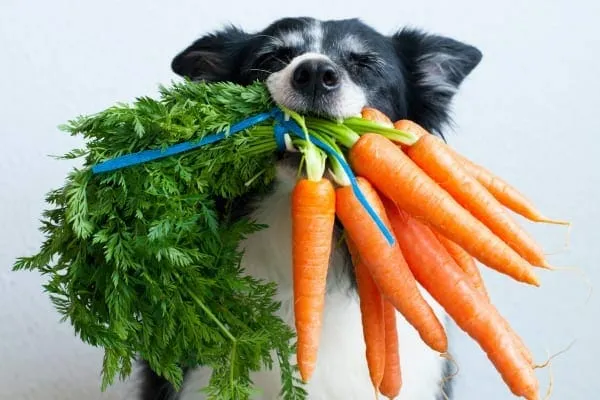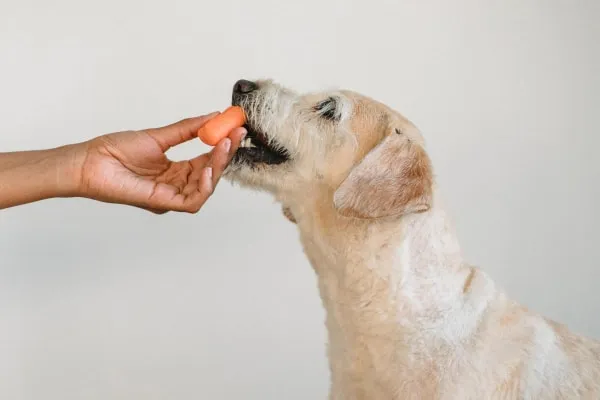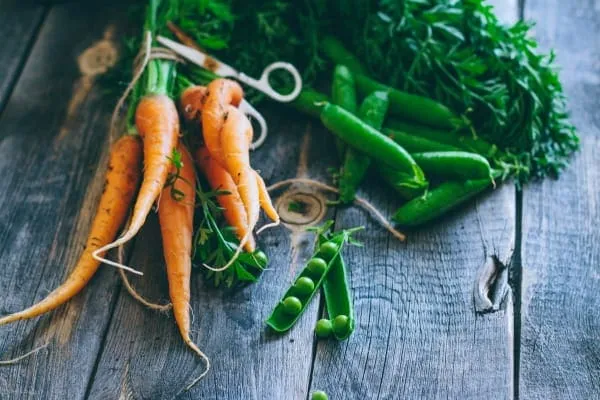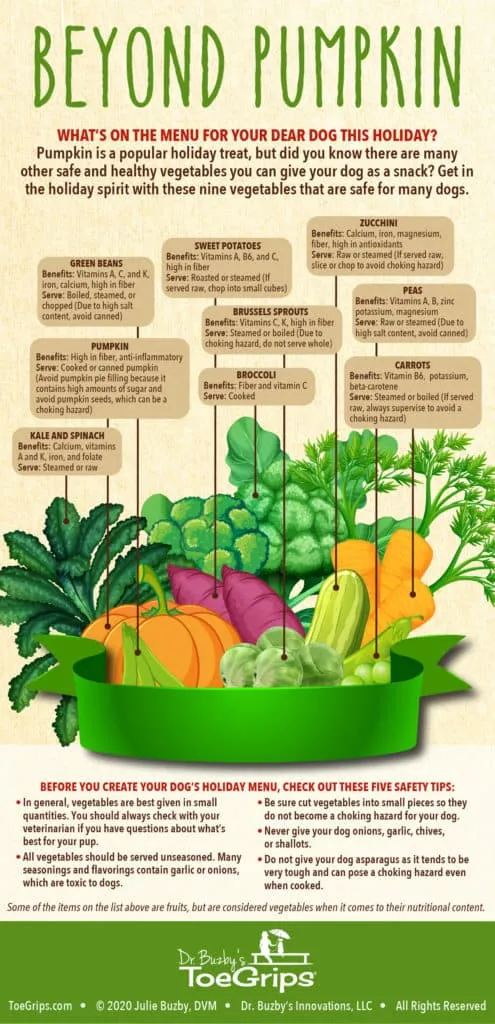As a loving pet parent, you’re constantly looking for ways to enhance your dog’s diet and overall well-being. A common question that arises is, “What Vegetables Can My Dog Eat Everyday?” The good news is, many nutrient-rich vegetables are not only safe but also highly beneficial as daily snacks or dietary supplements for your canine companion. From puppies to senior dogs, incorporating the right vegetables into their routine can offer a host of health advantages. However, it’s crucial to know which vegetables are safe for dogs and how to prepare them to avoid any risks. Let’s delve into the world of dog-friendly veggies with insights from a veterinary perspective.
 A happy Golden Retriever holding fresh carrots in its mouth, demonstrating how dogs can safely eat certain vegetables daily.
A happy Golden Retriever holding fresh carrots in its mouth, demonstrating how dogs can safely eat certain vegetables daily.
While humans and dogs have distinct nutritional requirements, we both thrive on a diet rich in vegetables. These natural foods can complement your dog’s regular diet, providing essential vitamins, minerals, and fiber. Understanding how to properly introduce and prepare these treats is key to a healthy and happy dog.
The Benefits of Feeding Your Dog Vegetables Daily
Incorporating vegetables into your dog’s diet can bring numerous health benefits, making them a fantastic addition to their daily meals or as special treats.
Weight Management
For dogs who are overweight, vegetable treats are an excellent option. They are naturally low in calories and high in fiber, which helps dogs feel full faster and stay satisfied for longer. This can significantly reduce overeating and manage calorie intake. I often recommend adding a portion of green beans with each meal for overweight dog patients to combat hunger while reducing overall calorie consumption. This proactive approach supports a healthy weight and helps prevent obesity-related health issues. For general safe food information, consider exploring what foods can you give your dog.
Digestive Health
The high fiber content found in many vegetables is a boon for your dog’s digestive system. Fiber promotes healthy bowel movements, aids in proper anal gland function, and helps prevent constipation. A well-functioning digestive tract is fundamental to nutrient absorption and overall gut health.
Immune System Boost
Vegetables are packed with essential nutrients, including vitamins and antioxidants, that can significantly boost your dog’s immune system. A strong immune system is vital for fighting off illnesses and keeping your dog resilient against common infections.
Diabetes Support
Certain vegetables can play a beneficial role in regulating blood sugar levels in dogs with diabetes. Their low glycemic index and high fiber content help to stabilize blood glucose, making them a suitable dietary component under veterinary guidance.
Antioxidant Power
Many vegetables are natural sources of antioxidants. These compounds help combat free radicals in the body, reducing oxidative stress and potentially lowering the risk of various chronic diseases. Including antioxidant-rich vegetables can contribute to your dog’s long-term health.
Training Rewards
Veggies make fantastic, healthy training treats. Their natural crunch and appealing taste can be highly motivating for some dogs, offering a low-calorie alternative to processed dog biscuits. Carrots, in particular, are a popular choice for their satisfying crunch.
14 Safe Vegetables Your Dog Can Eat Everyday
It’s important to remember that not all human foods are safe for dogs. Before introducing any new food into your dog’s diet, always verify its safety. Below are 14 of my top recommended vegetables that most dogs can eat daily, provided they are prepared correctly and given in moderation.
1. Pumpkin
Regardless of whether it’s botanically a fruit or a vegetable, pumpkin earns the top spot on my list of dog-safe options! It’s a powerhouse of fiber, making it excellent for combating stool problems in dogs. If your dog experiences diarrhea, the fiber in pumpkin helps to thicken stools by absorbing excess water. Conversely, for constipated canines, the added fiber encourages healthy bowel movements. Pumpkin also contains pepita oil, rich in linoleic acid (an omega-6 fatty acid), known for its anti-inflammatory effects, especially beneficial for skin health.
Plain cooked or canned pumpkin (not pie filling with added sugar and spices) is the easiest way to serve it. Introduce pumpkin by mixing one to two tablespoons with your dog’s regular food. Don’t be alarmed if their stool turns slightly orange – this is normal.
2. Broccoli
Broccoli is another excellent vegetable for dogs. It’s an outstanding source of fiber and provides vitamin C, crucial for a robust immune system. It’s best served cooked without seasonings. Small pieces of raw broccoli stalks can also be a great crunchy, low-calorie snack. Always cut broccoli into bite-sized pieces to prevent choking, especially for smaller breeds.
However, moderation is key. Eating too much broccoli can irritate the lining of the esophagus and stomach, and lead to gas and discomfort.
3. Carrots
I highly recommend carrots as a daily treat for dogs. They are a good source of potassium, vitamin B6, and an excellent source of beta-carotene.
 A dog happily accepting a raw carrot from its owner, showcasing carrots as a healthy and crunchy daily vegetable snack for dogs.Carrots are beloved for their crunch and can be a fantastic daily treat.
A dog happily accepting a raw carrot from its owner, showcasing carrots as a healthy and crunchy daily vegetable snack for dogs.Carrots are beloved for their crunch and can be a fantastic daily treat.
Beta-carotene gives carrots their distinctive orange hue and is converted into vitamin A in your dog’s body. Vitamin A is essential for immune function and vision, with a deficiency potentially leading to night blindness. Many owners serve carrots steamed or boiled. Raw carrots are a personal favorite for my dogs, offering a satisfying crunch. A one-ounce serving contains only ten calories, making them a filling, low-calorie option, ideal for dogs on a weight management plan.
Always supervise your dog and serve appropriately sized pieces to prevent choking. While low in calories, carrots are relatively high in natural sugars, so they should be given with caution to diabetic dogs.
4. Green Beans
Green beans are a fantastic source of vitamins A, C, and K, as well as minerals like iron and calcium. Their low-calorie, high-fiber content makes them incredibly beneficial for dogs with diabetes and those needing to lose weight, as they help dogs feel full.
Serve green beans boiled, steamed, or chopped. Avoid adding seasonings and steer clear of canned green beans with high salt content. Start with two to three green beans daily, ensuring treats comprise no more than ten percent of their diet unless advised otherwise by your veterinarian.
5. Kale and Spinach
Dark leafy greens such as spinach and kale are excellent choices for your dog’s daily vegetable intake. These vegetables are rich in:
- Calcium—Vital for strong bones.
- Vitamin K—Crucial for blood clotting.
- Vitamin A—Supports vision and immune health.
- Iron—An integral component of hemoglobin, which carries oxygen in red blood cells.
- Folate—Necessary for nutrient absorption in the small intestines.
Kale and spinach can be served steamed or raw, always without seasonings. One or two raw leaves are suitable as a snack, or shredded leaves can be mixed into your dog’s meal.
Due to their high calcium content, excessive kale can contribute to urinary problems and bladder stones. Like any treat, offer it in moderation. If your dog is predisposed to bladder stones or you have concerns, consult your veterinarian.
6. Brussels Sprouts
Brussels sprouts are another high-fiber vegetable offering vitamins C and K, and trace minerals like magnesium, which supports cellular metabolism and muscle function. When preparing for your dog, avoid oils or seasonings. Start with one or two sprouts at a time. Too many can cause gas, bloating, and abdominal discomfort.
Serve Brussels sprouts steamed or boiled, and always cut them into smaller pieces to prevent choking, especially for small to medium-sized dogs.
7. Zucchini
Zucchini is a healthy choice, containing calcium, iron, magnesium, and fiber, all promoting a healthy gastrointestinal tract. It can be served raw or steamed. Steaming makes it softer and easier to chew, which some dogs prefer.
Begin with three to four slices. Avoid zucchini prepared with seasonings or salad dressings, as many contain garlic and onions, which are toxic to dogs. Some dressings also contain xylitol (birch sugar), which is extremely toxic and can cause hypoglycemia, seizures, liver failure, and even death. It’s important to know what human foods a dog can’t have to keep your pet safe.
8. Sweet Potatoes
Sweet potatoes are a delicious, high-fiber food often found in commercial dog foods. They are an excellent source of vitamins A, B6, and C. There are various ways to serve them. If raw, chop them into small cubes. Steaming or roasting makes them softer, tastier, and reduces choking hazards. Introduce them with three or four slices at a time.
Similar to carrots, sweet potatoes have a high sugar content, so diabetic and overweight dogs should consume them sparingly or avoid them altogether.
9. Peas
Snow peas and sugar peas are great for your dog! They provide vitamins A and B, and minerals such as potassium, magnesium, and zinc, which are vital for a healthy immune system and thyroid gland function.
Steam or boil peas before feeding. A one-ounce serving contains only twenty calories, making them a perfect low-calorie daily snack. Avoid canned peas due to their high salt content. Peas also contain purines, a type of protein, so dogs with urinary incontinence or kidney issues should avoid them. If your dog is experiencing health issues, it’s wise to consult what can i give my sick dog to eat for guidance.
 An assortment of fresh, healthy vegetables like carrots, bell peppers, and green beans laid out on a table, illustrating safe and nutritious daily food options for dogs.Opt for fresh or frozen vegetables over canned versions, as canned varieties often contain excessive sodium.
An assortment of fresh, healthy vegetables like carrots, bell peppers, and green beans laid out on a table, illustrating safe and nutritious daily food options for dogs.Opt for fresh or frozen vegetables over canned versions, as canned varieties often contain excessive sodium.
10. Corn
Corn is a common ingredient in dog food, often unfairly labeled as a “filler.” However, it offers several nutritional benefits, including:
- Easily digestible carbohydrates: A great energy source.
- Linoleic acid: An essential nutrient not produced by dogs, vital for healthy skin, coat, and immune system.
- Rich in fiber: Supports digestive health and motility.
While corn kernels are safe, corn on the cob is not. The cob is indigestible and can cause blockages in the stomach or intestines, potentially requiring emergency surgery. Serve steamed kernels, ensuring they are free of extra seasoning or high salt content, and never add butter.
11. Celery
Like many other beneficial vegetables, celery is low in calories, fat, and cholesterol, making it another excellent veggie treat for dogs on a diet. Celery should be thoroughly washed and fed raw. Dogs who enjoy a good crunch often appreciate celery. However, its mild flavor means some dogs might not be as enthusiastic about it compared to other vegetables.
12. Cooked White Potatoes
Cooked white potatoes are safe for dogs and an excellent source of vitamin C, vitamin B6, iron, and magnesium, all important for your dog’s immune and nervous systems. The key word here is “cooked.”
Raw potatoes are toxic for dogs. As members of the nightshade family, raw potatoes contain solanine. Cooking neutralizes this substance. Ingesting solanine from raw potatoes can cause stomach upset, vomiting, and bloating.
13. Cauliflower
Cauliflower is a super vegetable packed with a wide array of healthy nutrients, including:
- Fiber
- Vitamin K
- Antioxidants
- Vitamin A
- Vitamin C
- Beta-carotene
- Minerals like potassium, calcium, and magnesium
Cauliflower can be fed cooked or raw, cut into bite-sized florets. While beneficial, it’s important not to overfeed cauliflower. Its fibrous nature can pose a choking hazard or cause an upset stomach if consumed in large quantities.
14. Beets
Beets are one of the most antioxidant-rich vegetables. With an 88% water content, they also provide folate, fiber, vitamin C, and essential minerals, making them highly beneficial for your dog’s skin and coat health.
Don’t be alarmed if you notice small amounts of red or pink coloring in your dog’s urine after they eat beets. This is due to natural pigments. If urine discoloration persists beyond 48 hours after discontinuing beets, consult your veterinarian.
Vegetables Your Dog Should Never Eat (Even Daily)
While many vegetables are safe and healthy, certain ones should never be fed to your dog due to their toxic properties or potential to cause severe health issues. It’s as important to know what human food dogs shouldn’t eat as it is to know what they can.
1. Onions, Garlic, Chives, and Shallots
Vegetables belonging to the Allium family are highly toxic to dogs because they can damage red blood cells, leading to anemia. This family includes:
- Onions
- Garlic
- Chives
- Shallots
If your dog consumes any of these foods, contact your veterinarian immediately. Signs of illness might take days to appear, so prompt action is crucial for emergency treatment.
2. Mushrooms
It’s generally safest to avoid giving any mushrooms to your dog. While some types may be less harmful, others can cause severe symptoms like diarrhea, stomach pain, nausea, and even life-threatening conditions. Wild mushrooms, often found in yards or on hiking trails, are particularly dangerous as many toxic species closely resemble harmless ones. Some can cause liver failure, kidney disease, lethargy, seizures, or even death. To ensure your dog’s safety, I advise against feeding any mushrooms.
3. Unripe Tomatoes
Like potatoes, tomatoes are part of the nightshade family. The toxic compounds in this family, primarily solanine, are most concentrated in unripe (green) tomatoes and the tomato plant itself (leaves and stems). Therefore, it is critical that your dog never consumes tomato plant leaves/stems or unripe green tomatoes.
If your dog does ingest parts of a tomato plant, consult your veterinarian immediately. Clinical signs to watch for include:
- Gastrointestinal upset (vomiting, diarrhea)
- Dilated pupils
- Depression
- Decreased energy
- Increased heart rate
4. Any Vegetables Posing a Choking Hazard
Throughout this guide, I’ve emphasized the importance of cutting vegetables into bite-sized pieces and sometimes cooking them to prevent choking. This is a critical safety measure, as choking can quickly become a life-threatening emergency. Fibrous or hard-to-chew vegetables like cauliflower and celery require extra caution. Always supervise your dog while they are eating these treats.
 Infographic detailing ten healthy vegetables dogs can eat every day, highlighting benefits such as improved digestion, immune support, and essential nutrients.
Infographic detailing ten healthy vegetables dogs can eat every day, highlighting benefits such as improved digestion, immune support, and essential nutrients.
How to Prepare Vegetables for Your Dog Safely
The way you prepare vegetables for your dog can significantly impact their safety, digestibility, and palatability. Preparation methods vary based on the type of vegetable and your dog’s preferences. If your dog isn’t keen on vegetables initially, try switching up the preparation method. For instance, my own dog and I might not enjoy raw broccoli, but we both love it steamed!
Here are some general ideas for preparing vegetables as snacks for your dog, keeping in mind specific preparation “best practices” mentioned above for certain veggies.
Raw
Raw vegetables make fantastic, convenient treats. They are easy to grab and take with you on the go; baby carrots are a particular favorite for my dog! When feeding raw veggies, thorough cleaning is paramount. Unlike cooked vegetables, raw produce isn’t exposed to high temperatures that kill bacteria and microbes. Proper scrubbing and washing are essential to remove dirt and pesticides.
Steamed
Steaming is an excellent way to prepare vegetables for your dog. It’s fast, easy, and helps preserve the vegetables’ vital nutrients.
Here are a few tips for steaming:
- Wash vegetables thoroughly before steaming.
- Chop them into uniform, bite-sized pieces to ensure consistent cooking.
- Always allow steamed veggies to cool completely before offering them to your dog to prevent burns.
Steamed vegetables are cooked just enough to warm them through, retaining a slightly crisp texture that many dogs enjoy.
Boiled
If your dog has dental issues or a sensitive mouth, boiled vegetables might be the best option. Boiled vegetables are softer than raw or steamed, making them easier to chew. However, because boiling involves higher temperatures and submerging vegetables in water, some nutrient loss may occur. The same tips for washing, chopping, and cooling apply to boiling.
Creative Preparation Tips
Perhaps your dog isn’t a fan of plain vegetables, and you want to get a little more creative. Here are some of my favorite tricks for preparing vegetables for my senior dog:
- Pureed—Use a blender to mash thoroughly washed and cooked vegetables. Some dogs prefer the smooth, applesauce-like texture of pureed vegetables. Pureed veggies can also be easily mixed in with their regular dog food, perfect for sneaking in extra nutrients.
- Frozen—Frozen vegetables are a great summer treat! Most fresh vegetables should be washed thoroughly and then cooked prior to freezing to maintain texture and safety. Frozen green beans or peas can be a delightful, cool snack.
With Your List of Vegetables Dogs Can Eat, You Can Choose Wisely
Even if your dog enjoys a high-quality commercial diet, incorporating safe vegetables offers numerous health advantages, making them a beneficial and tasty supplemental treat. Remember, these vegetables are not meant to provide a fully balanced diet and should not be your dog’s sole food source.
Experiment with different dog-safe vegetables to discover which ones your dog loves most. When introducing a new vegetable, always offer a very limited amount initially to monitor for any adverse reactions. If you have any doubts about a specific vegetable or its suitability for your dog’s individual health background, always consult your veterinarian for personalized advice and guidance.
